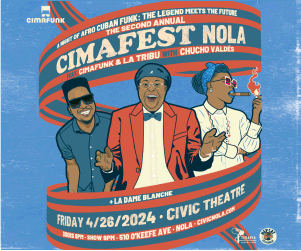Just returned to the office from a conference called “Voice of The Brand.” It’s the second one I’ve attended in the past six months.
VOTB is a series of conferences that bring together marketing people of all stripes and from all over the country to share ideas and solutions on what’s worked (and hasn’t worked) in developing new brands, expansions, improvements, implementation and reach. Participants can contribute new ideas, and the conference is designed to be interactive in helping to solve conference attendees’ problems by getting them to think outside the box and to get creative juices flowing through exposure to other marketing professionals. It’s also a wonderful networking opportunity for everyone there; this event, which focused on media included people from Google, Time-Warner Cable, Turner Broadcasting, Google, Buzzfeed, Olde New Orleans Rum, Vox Media, Reddit, Mignon Faget, Emeril’s Homebase, Bar/None Records, American Greetings Corporation, the New Orleans Jazz & Heritage Foundation and many more.
One of the more interesting parts of each conference is a “focus group” of consumers randomly selected by the organizers. This conference’s focus group consisted of four people—two men and two women, ranging in ad from 23 to 42.
 The marketers in the audience learn only a bit about each participant—mainly their age—and they have the opportunity to “pick the consumer brain” on what media and brands they use: useful bits of information, straight from the horse’s mouth, so to speak, as sometimes marketers get caught up in their own schemes and forget what their audience needs and actually consumes.
The marketers in the audience learn only a bit about each participant—mainly their age—and they have the opportunity to “pick the consumer brain” on what media and brands they use: useful bits of information, straight from the horse’s mouth, so to speak, as sometimes marketers get caught up in their own schemes and forget what their audience needs and actually consumes.
I was somewhat surprised to hear that none of the focus group people were interested in local music, nor did they go out to listen to music. The two younger participants (in their twenties) only were interested in bands and acts that were “passing through town,” i.e. national acts. However, three out of four of the focus group were sports fanatics, specifically football. Three were rabid Saints fans, one of those also followed other professional sports teams avidly through several websites (nba.com, nfl.com, etc.).
While the interest in sports doesn’t particularly shock me, I was interested to note that none of the people took an interest in local music.
I think we have to chalk up much of the growing interest in sports to the intense and intelligent marketing that’s done by professional sports teams.
It was also very interesting that most of the sports fans remembered commercials and products they saw during broadcast sports events more than any other time (so those exhorbitant prices for Super Bowl ads are worth the cost, I suppose).
So what does this have to do with music?
It clearly demonstrates that the more marketing dollars poured into cultivating a fan base, the bigger and more involved the market will get. Take the growth of female sports fans, for example. According to recent article on Forbes.com, in 2010, the NFL started seriously trying to seduce female fans by getting into the apparel business. Women make up nearly half of all NFL fans (45%; estimated to have increased to 48% in 2013), in addition to being the world’s dominant apparel and gift buyers. According to Forbes.com, women drive 70-80% of all consumer spending, and since almost half of them are active NFL fans, it makes perfect marketing sense to try to develop the female market and make more money by selling women NFL apparel and merch. Do you know that the first NFL apparel store was opened in New Orleans?
It occurred to me that we’re not developing our market for local music in the city either internally or externally. Any good marketer knows that you have to put some of your dollars into developing young markets and future fan bases and expanding your brand. The NFL—one of the premiere, if not the premiere marketing entity in the US—has used a successful long-term marketing strategy extremely well. It won over male fans consumers, and now it’s creating more female fans and winning them over too to spend more money that will enrich the NFL’s coffers.
So how can we take a lesson from these master marketers vis a vis music?
We’ll never be able to develop young viable music fans and supporters without ongoing music education that starts in grammar school, or even before. Unless our kids are exposed to musical history, culture and the music itself, ultimately the demand and appreciation for local music will shrink even further and could ultimately curl up and die.
There are indeed those of us who are rabid about our music, but we have to comprehend is that most local people really don’t appreciate our music heritage, because they’ve not ever really been exposed to it on an ongoing basis. This exposure ideally starts in school at a young age. All kids are exposed to the sports mentality from the time they’re little, and throughout their school years. There’s a reason why football fans have been growing over the past 50 years or so. It’s probably also a reason why our educational system in the US is inferior to other countries.
If we value our music, then we need to create a market for it, in schools, from a young age. I know that music and the arts have been pushed to the bottom and in many cases eliminated from our public schools’ curriculum. There are of course, efforts to help make sure our kids are exposed to music that are provided by a few non-profits locally and nationally. It’s just not enough.
To tell the truth, if I had a choice, I’d rather see my offspring knowledgeable about and participating in music in addition to sports. But if I had to choose, I believe music and the arts lay a much better foundation for learning, literacy and achievement than sports does. Sports engenders teamwork, discipline, physically healthy bodies, strategic thinking and competition. But music can do this and more: creativity, sequential learning skills, mathematical, reading and problem-solving skills, higher test scores, and so on. There’s a strong correlation between music education and academic achievement, which certainly doesn’t exist with an emphasis on sports.
We just need an NFL-type powerhouse to get that marketing message across.
I’d like to hear your comments on what we can do–if not nationally, at least locally–to insure that our kids have an education that includes music in all schools. Any suggestions?




